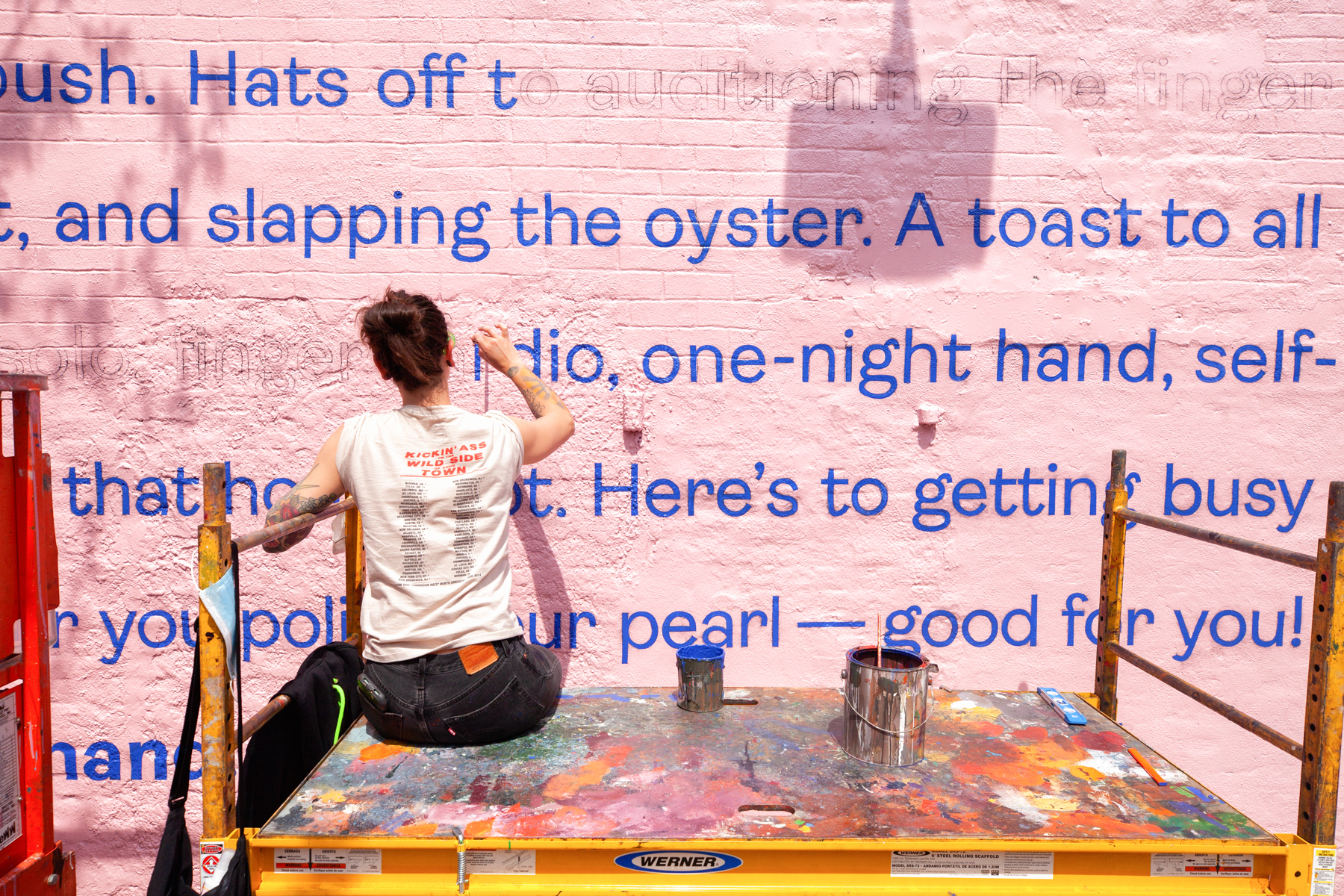Women do it too: New billboards in Brooklyn celebrate the joys of jerking off
A campaign for K-Y gives 'Masturbation Month' a hand—and urges you to do the same
If you were to walk down Wythe Avenue at North 10th in Williamsburg, or round the corner of Jefferson and Wyckoff Avenues in Bushwick, you might encounter a big ol’ sign urging you to … rub one out.
You’ve heard of “No-Nut November,” now get ready for the opposite: “Masturbation May.” What began as a mini-protest movement—a San Francisco based sex shop, Good Vibrations, started Masturbation Month in 1995 in response to the firing of then-Surgeon General Dr. Joycelyn Elders for suggesting that masturbation be included in youth sex education programs—is now a full-scale public display.
Earlier this month, the personal lube peddlers at K-Y partnered with the ad agency Elephant to, uh, erect a series of billboard installations across three different New York City neighborhoods–the East Village, Williamsburg and Bushwick–each with brightly colored, hand-painted taglines celebrating the wonders of wanking—a topic that’s often considered taboo, particularly among humans who identify as women.
“Masturbation is taboo for the same reason things are broken in society: whatever society decides is good, is great, and whatever is labeled as bad, is unholy,” explains Nina Mourin, an associate creative director at Elephant. “What’s going to make masturbation, or any other mislabeled taboo in society, not taboo is talking about it. Normalizing it. Educating around it. Making it feel safe, welcoming, inclusive—and in our case, celebratory.”
It’s been a long time coming.
 K-Y, originally a pharmaceutical company and suture manufacturer, was established in 1904 in New York City. Back then its jelly was designed and marketed as a surgical lubricant. It wasn’t until 1980 that K-Y was permitted to sell their lubes, which by then had taken on a slightly different purpose, in stores. It would take another 17 years before their first public advertisement. Over a century later, masturbation, especially for women, is still not widely discussed. Why?
K-Y, originally a pharmaceutical company and suture manufacturer, was established in 1904 in New York City. Back then its jelly was designed and marketed as a surgical lubricant. It wasn’t until 1980 that K-Y was permitted to sell their lubes, which by then had taken on a slightly different purpose, in stores. It would take another 17 years before their first public advertisement. Over a century later, masturbation, especially for women, is still not widely discussed. Why?
“Because we live in a patriarchy with double standards,” Mourin says. “Period.”
The billboard installations, purposefully designed to pop, are an effort to jumpstart those conversations, or at least make them less taboo. K-Y is perhaps counter-intuitively starting with what they call the “sex-positive” neighborhoods in New York. De-stigmatization is evidently a block by block business.
“The idea isn’t to shock people; the idea is to celebrate with people,” Mourin says. “In order to make a difference, we first need to rally the troops, and placing our work in like-minded neighborhoods was our way of doing that.”
In recent years, advertising trends across a wide range of products and brands have been more frank about women’s bodies, menstruation, sexuality, and other often off-limits topics: Thinx, the period underwear brand, has been explicit (and funny) about women’s health in its ads. Pantone last year created a shade of red called “period red” with Swedish brand Intimina. Dove has been at the forefront of beauty equality with its Real Beauty campaign for years.
But don’t call it a trend. Mourin is adamant that this is progress.
“It’s a shame to call openness a trend when in fact those advertisers too were using their platforms to normalize womanhood,” she says. “If it weren’t for these brands taking a chance in the mainstream, there wouldn’t be curvy models or armpit hair in adverts. It’s thanks to them we are able to celebrate masturbation in murals across NYC because they paved the way for normalizing bodies, sexuality and the reality of being a self-identifying woman.”
And given the pandemic, perhaps there’s never been a better time to opt for onanism. Last summer, when the city published guidelines for getting it on during a pandemic, there was no beating around the bush: “You are your safest sex partner.”
K-Y’s Masturbation Month campaign will run for the rest of May, but that doesn’t necessarily mean every month can’t be a celebratory one. Provided individuals make their own choices about what’s right for them, there’s no such thing as too often according to Mourin.
“Is too much of a good thing bad for you when it’s proven to be good for you?” she says. “You decide. As long as it’s still a good time, I say go nuts.”
So if you’ve looking for a reason to, as the horny billboard reads, “stir that honey pot,” this is your sign to do it— literally. Now if you’ll excuse us …
You might also like 


























